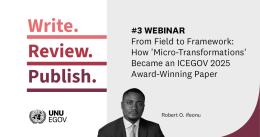Community health workers (CHW) are an indispensable workforce of Primary Health Care, yet they remain structurally undervalued and unrecognised as formal workers. While CHWs, who are predominantly women, are central to expanding access to safe and comprehensive health services especially to the most marginalised, their work continues to be situated within precarious structural conditions that reflect broader dynamics anchored in the exploitation of feminised labour.
Through three virtual events, UNU-IIGH in partnership with UNICEF, PSI and the Imarisha Consortium, which includes l’Institut National de Santé Publique, Ifakara Health Institute, Resade, and the University of the Western Cape, will:
- Examine how CHWs across South and Southeast Asia have been collectivising, challenging gender-based power dynamics, and organising for their rights and official recognition as public health workers
- Conduct a collaborative and interactive workshop on a policy tool developed to strengthen CHW policies and address gender inequalities affecting CHWs, including recruitment, training, roles and responsibilities, remuneration, and career progression
- Address the distinct risks and forms of gendered workplace violence experienced by CHWs in Africa and explore what more can be done to strengthen the protection and support they receive
Success stories from South and Southeast Asia: Organising as a tool to achieve regularisation and recognition
Wednesday November 12, 2025, from 16:00 to 17:00 (ICT / UTC+7) | Co-organised with PSI
Drawing on experiences from India, Pakistan, Nepal and the Philippines, community health workers will share and reflect on successful cases and lessons of collectivisation and organising embedded in feminist transformative principles, for recognition as public health workers, regularisation of their work, and situating CHWs’ workplace struggles within broader gender justice issues. The session will also provide an opportunity to hear from governments and other experts on what can be learnt from these experiences with the potential for these efforts to be replicated in other contexts.
Workshop: Strengthening CHW policies through a gender-responsive tool
Thursday November 13, 2025, from 18:00 to 19:00 (ICT / UTC+7) | Co-organised with UNICEF
This workshop begins with a summary of gender-sensitive policies and practices related to female CHWs in South Asia followed by workshopping of a gender responsive policy analysis tool. Participants invited to share their reflections and thoughts on the tool designed to help stakeholders identify gaps and opportunities in CHW policies to tackle gender inequalities. Participants will be invited to reflect on the tool’s relevance and discuss pathways for its adaptation and implementation across diverse contexts.
Rethinking How We Address Gendered Workplace Violence: Perspectives from CHWs
Friday November 14 2025, from 18:00 to 19:00 (ICT / UTC+7) | Co-organised with the Imarisha Consortium
As a predominantly feminised and often informal workforce operating within community settings shaped by power hierarchies and governance overlaps, CHWs face highly contextualised and differential forms of vulnerability to violence. This session provides a platform for community health workers and researchers to discuss possible measures that could be adopted to protect CHWs from gendered workplace violence, considering the specificities of their unique work environments.


